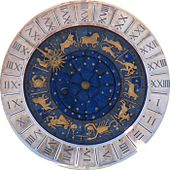 Global Information
Global InformationHistory of astrology information
This article's lead section may be too long. (January 2024) |
| Astrology |
|---|
 |
| Background |
|
| Traditions |
|
| Branches |
|
| Astrological signs |
|
| Symbols |
|
Astrological belief in correspondences between celestial observations and terrestrial events have influenced various aspects of human history, including world-views, language and many elements of social culture.
Among West Eurasian peoples, the earliest evidence for astrology dates from the 3rd millennium BC, with roots in calendrical systems used to predict seasonal shifts and to interpret celestial cycles as signs of divine communications.[1] Until the 17th century, astrology was considered a scholarly tradition, and it helped drive the development of astronomy. It was commonly accepted in political and cultural circles, and some of its concepts were used in other traditional studies, such as alchemy, meteorology and medicine.[2] By the end of the 17th century, emerging scientific concepts in astronomy, such as heliocentrism, undermined the theoretical basis of astrology, which subsequently lost its academic standing and became regarded as a pseudoscience. Empirical scientific investigation has shown that predictions based on these systems are not accurate.[3]: 85, [4]: 424
In the 20th century, astrology gained broader consumer popularity through the influence of regular mass media products, such as newspaper horoscopes.[5]
Astrology, in its broadest sense, is the search for human meaning in the sky; it seeks to understand general and specific human behavior through the influence of planets and other celestial objects. It has been argued that astrology began as a study as soon as human beings made conscious attempts to measure, record, and predict seasonal changes by reference to astronomical cycles.[6]
Early evidence of such practices appears as markings on bones and cave walls, which show that lunar cycles were being noted as early as 25,000 years ago; the first step towards recording the Moon's influence upon tides and rivers, and towards organizing a communal calendar.[7] With the Neolithic Revolution new needs were also met by increasing knowledge of constellations, whose appearances in the night-time sky change with the seasons, allowing the rising of particular star-groups to herald annual floods or seasonal activities.[8] By the 3rd millennium BC, widespread civilisations had developed sophisticated awareness of celestial cycles, and are believed to have consciously oriented their temples to create alignment with the heliacal risings of the stars.[9]
There is scattered evidence to suggest that the oldest known astrological references are copies of texts made during this period, particularly in Mesopotamia (Sumer, Akkad, Assyria and Babylonia). Two, from the Venus tablet of Ammisaduqa (compiled in Babylon round 1700 BC) are reported to have been made during the reign of king Sargon of Akkad (2334–2279 BC).[10] Another, showing an early use of electional astrology, is ascribed to the reign of the Sumerian ruler Gudea of Lagash (c. 2144–2124 BC). This describes how the gods revealed to him in a dream the constellations that would be most favourable for the planned construction of a temple.[11] However, controversy attends the question of whether they were genuinely recorded at the time or merely ascribed to ancient rulers by posterity. The oldest undisputed evidence of the use of astrology as an integrated system of knowledge is therefore attributed to the records that emerge from the first dynasty of Mesopotamia (1950–1651 BC).[12]
- ^ Koch-Westenholz (1995) Foreword and p.11.
- ^ Kassell and Ralley (2010) ‘Stars, spirits, signs: towards a history of astrology 1100–1800'; pp.67–69.
- ^ Jeffrey Bennett; Megan Donohue; Nicholas Schneider; Mark Voit (2007). The cosmic perspective (4th ed.). San Francisco, CA: Pearson/Addison-Wesley. pp. 82–84. ISBN 978-0-8053-9283-8.
- ^ Zarka, Philippe (2011). "Astronomy and astrology". Proceedings of the International Astronomical Union. 5 (S260): 420–425. Bibcode:2011IAUS..260..420Z. doi:10.1017/S1743921311002602.
- ^ Campion (2009) pp.259–263, for the popularizing influence of newspaper astrology; pp. 239–249: for association with New Age philosophies.
- ^ Campion (2008) pp.1-3.
- ^ Marshack (1972) p.81ff.
- ^ Hesiod (c. 8th century BC). Hesiod’s poem Works and Days demonstrates how the heliacal rising and setting of constellations were used as a calendrical guide to agricultural events, from which were drawn mundane astrological predictions, e.g.: "Fifty days after the solstice, when the season of wearisome heat is come to an end, is the right time to go sailing. Then you will not wreck your ship, nor will the sea destroy the sailors, unless Poseidon the Earth-Shaker be set upon it, or Zeus, the king of the deathless gods" (II. 663-677).
- ^ Kelley and Milone (2005) p.268.
- ^ Two texts which refer to the 'omens of Sargon' are reported in E. F. Weidner, ‘Historiches Material in der Babyonischen Omina-Literatur’ Altorientalische Studien, ed. Bruno Meissner, (Leipzig, 1928-9), v. 231 and 236.
- ^ From scroll A of the ruler Gudea of Lagash, I 17 – VI 13. O. Kaiser, Texte aus der Umwelt des Alten Testaments, Bd. 2, 1-3. Gütersloh, 1986-1991. Also quoted in A. Falkenstein, ‘Wahrsagung in der sumerischen Überlieferung’, La divination en Mésopotamie ancienne et dans les régions voisines. Paris, 1966.
- ^ Rochberg-Halton, F. (1988). "Elements of the Babylonian Contribution to Hellenistic Astrology". Journal of the American Oriental Society. 108 (1): 51–62. doi:10.2307/603245. JSTOR 603245. S2CID 163678063.